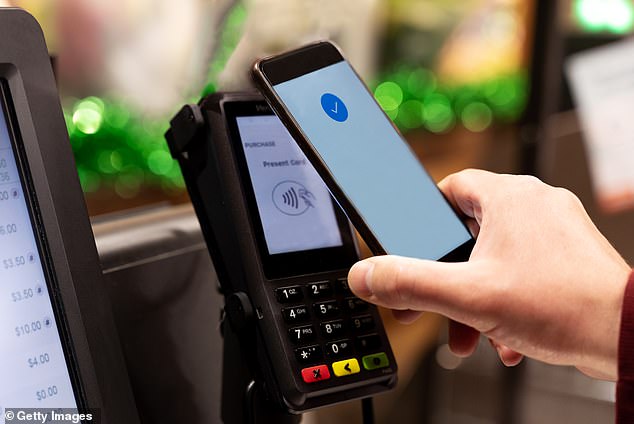Anthony Albanese’s video on the price of a regular coffee has backfired despite the Prime Minister seeking to end debit card surcharges.
The Australian Labor Party shared a video on social media on Thursday in which Albanese compares the price of two takeaway coffees.
“This flat white is five dollars,” he said, holding up a cup.
And this one costs $5.10. Because? Because this one was paid in cash and this one with a card.
‘It’s not fair. These excessive card surcharges are simply not right, and over the course of a year, they add up.
“That’s why we’re preparing to ban debit card surcharges.”
However, many cafe owners criticized him for the proposed ban.
“As a coffee shop owner, this will only drive up coffee prices to cover the cost of the banks’ surcharge.”
Another added: “So stop banks from charging excessive fees to small business owners.”
Anthony Albanese’s TikTok about the price of a regular coffee has flopped despite Prime Minister seeking to end debit card surcharges
‘Don’t penalize us for trying to stay afloat. Eftpos fees cost me thousands of dollars a year if I don’t pass them on to my clients.
Another said: ‘Is it true that cafes simply pay the electronic transaction fee, which will lead to them collapsing or raising their prices?’ Ruins.’
“Let’s make small businesses, who have to pay fortunes for the operation of Efptos machines, foot the bill,” questioned a third.
However, Rashays owner Rami Ykmour praised the government for the ban on surcharges and called on Albanese to go a step further.
“If we listen carefully to Mr. Albanese, when he says that he only wants to deduct charges from debit cards, he again falls short. It should be removed from all cards, both debit and credit. Mr. Albanese, stop playing with us .
He explained that Rashays no longer charges debit and credit card surcharges on any transactions. Instead, the company is now absorbing those costs as part of its daily operating expenses.
Other Australians took the opportunity to criticize the prime minister, some pointing to his recent $4.3 million purchase of his beachfront property on the New South Wales central coast.
‘Coffee on the Central Coast costs $4.3 million?’ one wrote.
“Yes, because Eftpos surcharges are the reason families sleep in cars,” said another, referring to Australia’s housing crisis.
‘You know what else is not right Albo? “They tax us on our salaries, then on fuel, groceries, clothes and everything we buy,” one of them commented.
‘So I received my tax bill and it says I can pay with a credit or debit card but I will incur card charges, so is it okay for the government to charge?’ said one.
“Coffee actually cost three dollars before you came to power,” another posted.
Meanwhile, others praised the prime minister for taking steps to remove the surcharge entirely.
‘Good for you, Albo!’ said one.
‘Good idea, it would be nice if things cost what they tell you at the register!’ said another.
‘Excellent news!’ said a third.
‘Well said PM!’ said one comment.
The Australian Competition and Consumer Commission will receive an additional $2.1 million in funding to investigate the fees businesses pay banks to use card readers, which are ultimately passed on to shoppers.
The Labor Party is looking at ways to reduce the price of grocery bills and other charges for struggling households.
Treasurer Jim Chalmers said the government was prepared to ban debit card surcharges from early 2026, pending further consultation from the Reserve Bank of Australia.
“Consumers shouldn’t be punished for using cards or digital payments, and at the same time, small businesses shouldn’t have to pay high fees just to get paid,” he said.
“We are prepared to ban debit card surcharges, subject to further work by the Reserve Bank and safeguards to ensure both small businesses and consumers can benefit from lower costs.”
The RBA is responsible for regulating the payments system and is carrying out a review of the costs for merchants and the level of surcharges applied to consumers.
Months ago, National Australia Bank boss Andrew Irvine admitted surcharges on card payments were outdated and “scandalous”.

Labor is looking to reduce the surcharges customers charge when using eftpos machines
He said surcharges might have been justified two decades ago, when card payments were rare and most people paid in cash, but not today.
Prime Minister Anthony Albanese said that “The number one priority is to alleviate the cost of living for homes and businesses, and this is another step to protect Australians.”
While inserting a card into an Eftpos machine typically costs a merchant less than 0.5 percent per transaction, using contactless payments with Visa and Mastercard can amount to between 0.5 and 1 percent each time. for debit cards and between 1 percent and 1.5 percent for credit cards.
On a $100 purchase, the average added cost is 28c for EFTPOS, 52c to use the Mastercard network, 47c to use Visa and a whopping $1.88 for digital payments provider Square.
While some larger companies absorb these costs in the price of their goods and services, many smaller companies pass them on in the form of higher prices.

